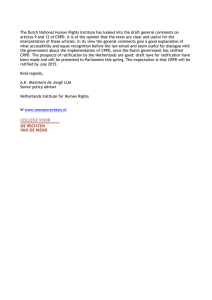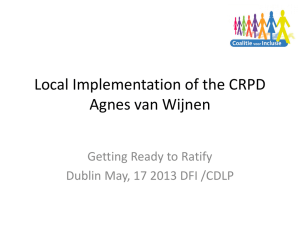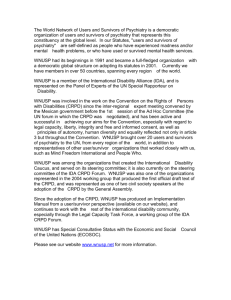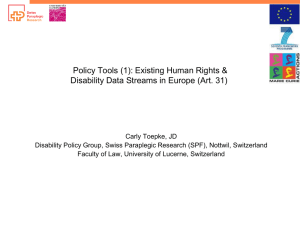IDA CRPD FORUM STEERING COMMITTEE
advertisement
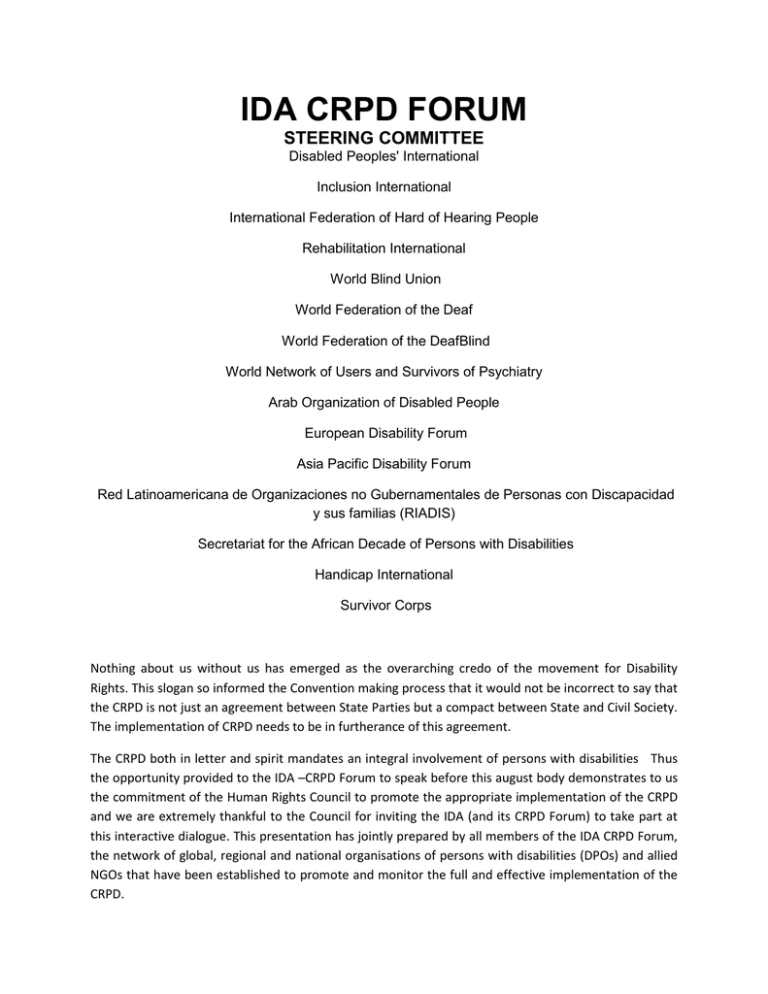
IDA CRPD FORUM STEERING COMMITTEE Disabled Peoples' International Inclusion International International Federation of Hard of Hearing People Rehabilitation International World Blind Union World Federation of the Deaf World Federation of the DeafBlind World Network of Users and Survivors of Psychiatry Arab Organization of Disabled People European Disability Forum Asia Pacific Disability Forum Red Latinoamericana de Organizaciones no Gubernamentales de Personas con Discapacidad y sus familias (RIADIS) Secretariat for the African Decade of Persons with Disabilities Handicap International Survivor Corps Nothing about us without us has emerged as the overarching credo of the movement for Disability Rights. This slogan so informed the Convention making process that it would not be incorrect to say that the CRPD is not just an agreement between State Parties but a compact between State and Civil Society. The implementation of CRPD needs to be in furtherance of this agreement. The CRPD both in letter and spirit mandates an integral involvement of persons with disabilities Thus the opportunity provided to the IDA –CRPD Forum to speak before this august body demonstrates to us the commitment of the Human Rights Council to promote the appropriate implementation of the CRPD and we are extremely thankful to the Council for inviting the IDA (and its CRPD Forum) to take part at this interactive dialogue. This presentation has jointly prepared by all members of the IDA CRPD Forum, the network of global, regional and national organisations of persons with disabilities (DPOs) and allied NGOs that have been established to promote and monitor the full and effective implementation of the CRPD. The IDA –CRPD Forum has been in active communication with the Office of the High Commissioner of Human Rights and has contributed extensively to the thematic study prepared by the OHCHR. Whilst we are largely satisfied with the manner in which the study has addressed some of the key challenges States are faced with in the implementation process of the CRPD; some of the key issues raised in our submission to the OHCHR have not been adequately addressed in the thematic study. We would particularly wish to highlight two of them : o First, Article 13 of the CRPD which makes provision for Access to Justice. Now this article might not be contentious but it requires two kinds of legislative changes if persons with disabilities are to obtain equal access to the justice system. Firstly laws that limit the legal capacity of persons with disabilities as players in the justice system for example to serve as witnesses need to be repealed. And secondly, laws need to be enacted which accommodate for the needs of persons with disabilities; facilitate for example full communication by a witness with disability. Very few countries are aware of this aspect of access to justice, let alone have justice systems which are able to meet all the accessibility and reasonable accommodation requirements foreseen in the CRPD. It is especially important to disseminate information about the meaning of the right and how to implement it as technical knowledge and support may be required to meet its mandate. The OHCHR study shows an acquaintance with the article when it refers to the necessity of judicial protection of rights; however such judicial protection will assume meaning for persons with disabilities only with accessible procedures and reasonable accommodation. We invite the Council to examine the detailed proposals the IDA_CRPD forum has made on the issue. o The second issue we wish to refer to is sign language. Recognition of Sign languages in State’s legislation, policies and practices is the key for the access to the rights of deaf persons and should be seen as a key legal implementation measure. It cannot be emphasized enough that States have to recognise the importance of providing services and education in sign language in order to ensure Deaf people’s human rights. However, the focus of our intervention today is on those issues which the IDA- CRPD Forum sees as key challenges in the full implementation of the provisions of the CRPD. - We first refer to the need for CRPD consonant Mental Health Laws. We find amongst others an African country that has ratified the CRPD, has included provisions on deprivation of liberty and involuntary treatment its Mental Health Bill which are absolutely contrary to the provisions of the CRPD. And this despite the fact that the CRPD’s prohibition of mental - health detention and compulsory treatment has been highlighted by the OHCHR’s thematic study. The second set of challenges arise from interpretative declarations, amounting in our view to reservations, which some States Parties most notably have made on articles 12 (Equal recognition before the law), 14 (Liberty and security of the person) , 17 (Protecting the integrity of the person) and 18 (Liberty of movement and nationality) of the CRPD. These declarations compromise the universality of CRPD and need to be interrogated. - Such interrogation is also needed because we find, on the basis of the information so far obtained from our national member organisations, that even when States Parties have not made reservations to these articles there is little understanding amongst Governments on the need to change national legislation in these areas. - The IDA CRPD Forum is aware that some of the provisions of the CRPD will need time for their full implementation. The fact that such time is needed is no reason to continue with practices which are opposed to the CRPD. Further the concession of progressive realization cannot be extended to even those obligations which can be immediately fulfilled. Illustratively some time would be required to design and put in place the new social structures to fulfil the article 12 mandate of support. However, the time required to fulfil this obligation in no way prevents States from immediately identifying and weeding out legislations which are inconsistent with the CRPD. Such calibrated strategies are required in order to obtain full implementation of article 12. - Our national members inform that the implementation of article 33 is posing a special challenge. Consequently, along with a number of other suggestions that we have made for the Human Rights Council Resolution on the Rights of Persons with Disabilities to be adopted at this session, we request the OHCHR to undertake a study on how States can comply with article 33 on national implementation and monitoring. Even as the CRPD is a live example of the indivisibility of human rights. The Civil-Political dimension of the Convention best embodies the paradigm shift that the CRPD has ushered in the field of disability rights. It is here that technical guidance should be provided by the UN and in particular by the OHCHR. Of great significance here is the right to participation. Article 4(3) of the CRPD makes it a general obligation of all States Parties to closely consult with and actively involve persons with disabilities including children with disabilities through their representative organizations in developing policies to implement the present Convention. In our view what this obligation requires is that State parties should undertake their tasks of governance in full awareness of their impact on persons with disabilities. Thus persons with disabilities cannot be thought of after the event, they need to be kept in view from the first instance. Further governance activities cannot be segregated into those which concern persons with disabilities and those which do not concern them. All governance activities impact upon persons with disabilities and hence concern them. More importantly, all governance benefits from a disability perspective. To illustrate on February 20 and 23 the Human Rights Council held a special session on the impact of the financial crisis and adopted a Resolution which did not include a reference to persons with disabilities; despite the fact that persons with disabilities are at particular risk in the current economic crisis. Disability needed to be taken on board because this sector more than any other provides an avenue for creative government spending. The supported inclusion of persons with disabilities allows not just for the growth and development of persons with disabilities but allows for the development of capabilities of significant others be they disabled or non disabled. More importantly, since dependence is an integral part of the human condition, the creation of the support network will benefit society at large and not just persons with disabilities. A Disability informed human rights perspective provides the best reasons for the adoption of an interdependent model of human development. And whilst we seek general and special awareness raising programmes, we do believe that the force of sensitization activities is redoubled when power wielders are seen as walking their talk.
